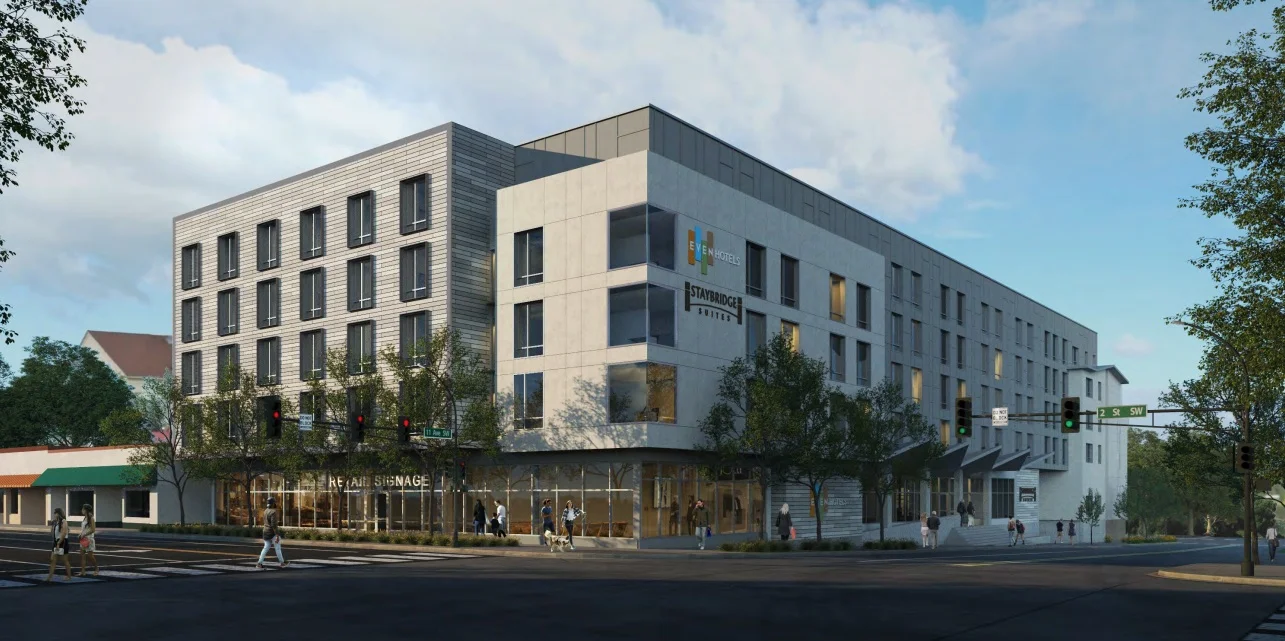Council recap: More bike lanes planned for downtown
There are two things certain to cause a controversy in city government each time they are discussed: taxes and bike lanes.
The latter of those two headaches was debated Monday by the Rochester City Council. Before the body was a recommendation to construct bike lanes along three streets downtown. Once completed, the bike lanes would represent the first phase of DMC’s proposed City Loop.
The City Loop project aims to create an urban trail network connecting new and existing pathways through downtown.
“Downtown has always been identified as a barrier to getting into and/or across the central part of the city due to the absence of bike facilities in the central business district,” says a report from the city.
As a result of the motion adopted Monday by the council, the city will now put out a request for bids for construction of the bike lanes. The project cost estimate is $1.4 million. It will be paid for with state DMC funds.
Green shows where bike lanes will be added
The goal is to begin construction this fall and be finished by summer 2020. North to south, the lanes would extend along Third and Fourth Avenues from Soldiers Field to north of Civic Center Drive. The east to west connection is Center Street from Mayo Park Drive to 4th Avenue Southwest.
DMC describes the City Loop as a “defining investment” that will offer an attractive recreational and mobility option, extend the city’s existing 85-mile trail system, and spur economic development along its route.
“This is the future,” said Council Member Michael Wojcik. “We’ve had this debate many times approving a sustainable, comprehensive plan. We know this is the direction cities are going … It’s attractive to young people. It’s a healthier lifestyle. It helps to address some of our congestion issues.”
A couple members of the council brought up concerns about the loss of meter revenue in areas where parking will be removed. Council President Randy Staver, who voted against the motion, also suggested the city not move forward until it has a plan to connect the entire downtown.
“It’s problematic for me to approve even a phase one if I don’t know where it’s going to start and where it’s going to end eventually,” said Staver.
Ultimately, there were enough votes from the council to move forward with the first phase of the project. Wojcik, Keane, Campion and Johnson were in support; Staver, Bilderback and Palmer voted nay.
Once up, the City Loop will offer wayfinding signage and will be ADA accessible. The bike lanes being added in this first phase will have have a painted buffer and bollards separating riders from the road.
Beep, beep…
Electric scooters will begin rolling into Rochester on August 1.
The council voted 5-2 on Monday in support of a 16-week pilot program with Lime scooters. The company plans to start with 100 scooters locally.
Deputy Administrator Aaron Parrish said testing the use of scooters will help the city understand things like, “if we are going to regulate scooters, what logical things we should include in an ordinance.”
On Monday, the proposal was met with some scrutiny from the council.
Council Member Mark Bilderback questioned who would enforce regulations regarding where the scooters can and cannot be used. The scooters are, for instance, prohibited from being used on sidewalks.
Council President Randy Staver expressed concerns regarding safety.
“I am not opposed to trying it, but I’m a little reluctant to go into it without any rules or regulations, knowing other cities have already forged this path and perhaps we could learn from them,” said Staver.
Council Member Patrick Keane said he understands some of the concerns out there, but ultimately he felt it was worth giving the scooters a try.
“When a program is this big, you are going to find a lot of ugly reports out there about things that have gone wrong,” said Keane. “But as a city that is trying to look for other modes of transportation, especially with these last-mile sort of commutes, I think this is an experiment we want to take.”
The city says it will provide additional public education as the program takes effect. Once the pilot stage is over, the city plans to spend the winter meeting with stakeholders to determine a long-term strategy.
City building standards
Lastly, the council gave the green light to a new policy regarding the remodeling and construction of city-owned buildings.
The council adopted an Energy Commission recommendation that requires that the construction meet either the Leadership in Energy and Environmental Design (LEED) standards for new construction or the State of Minnesota B3 Guidelines.
The goal is to make city buildings more energy efficient, achieve lower operating costs, and create a healthier indoor environment.
Sean Baker is a Rochester journalist and the founder of Med City Beat.









